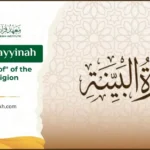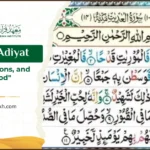Introduction: The Etiquette of Total Victory
Imagine dedicating over two decades of your life to a single, profound mission. You’ve faced persecution, exile, boycotts, and battles. Then, finally, the moment of ultimate, undeniable victory arrives. You conquer the very city you were forced to flee, Makkah. You see your former enemies embracing your message “in crowds.”
This is the scene when Surah An-Nasr (The Divine Support) was revealed.
It is a moment of pure triumph. Yet, what was the divine command at this peak of success? It was not a call for celebration or rest. It was a command for two specific actions: Tasbeeh (Glorification) and Istighfar (Seeking Forgiveness).
This short, 3-verse (Medinan) surah is not just about victory. It is the ultimate lesson in the etiquette of success, and it holds a profound, hidden message that made some of the Prophet’s (ﷺ) closest companions weep.
Listen to Surah An-Nasr: Recitation by Sheikh Mishary Rashid Alafasy
Listen to this beautiful recitation to perfect your pronunciation and reflect on the meanings before reading the explanation.
The Anatomy of Success: Understanding the 3 Verses
Surah An-Nasr is a complete narrative in three parts: The Sign, The Result, and The Response.
1. Iza jaa-a nas rullahi walfath (When comes the Help of Allah, and Victory,)
- The Contemplation (The Sign): This refers directly to the “Fath” (Victory) of the Conquest of Makkah. This was the “manifest Victory” Allah had promised. It was the definitive sign that the mission was succeeding by Allah’s direct help (Nasr), not by human strength.
2. Wa ra-aitan naasa yadkhuloona fee deenil laahi afwajah (And you see the people enter Allah’s Religion in crowds,)
- The Contemplation (The Result): For years, many Arab tribes had waited on the sidelines to see who would win: Muhammad (ﷺ) or his powerful tribe, the Quraysh. When the Quraysh were overcome, it was a clear sign to them that he was a true Prophet. As the hadith of Amr bin Salama mentions, they “rushed to embrace Islam.” This was the result of the victory: the mission was complete.
3. Fa sab bih bihamdi rabbika was taghfir, innahu kaana tawwaaba (So celebrate the praises of thy Lord, and pray for His Forgiveness: For He is Oft-Returning.)
- The Contemplation (The Command): This is the most profound part. At the very moment of success, the command is to turn back to Allah in humility.
- Fa Sabbih (So glorify): Acknowledge that this victory is His perfection, not yours.
- Was-taghfir (And seek His forgiveness): Seek forgiveness for any shortcomings or feelings of self-pride that may have entered your heart during the long struggle. It is a purification after the completion of a great task.
The Prophetic Response: How the Prophet (ﷺ) Implemented This Surah
The Prophet (ﷺ) understood this command immediately and it changed his daily worship.
‘Aishah (ra) reported that after this Surah was revealed, the Messenger of Allah (ﷺ) frequently recited in his bowing (Ruku) and prostration (Sajdah):
“Subhanaka Rabbana wa bihamdika, Allahum-maghfir li” (Far removed You are from every imperfection, our Lord, and all praise is for You, forgive me, O Allah).
When she asked him about these “new words,” he replied that his Lord had given him a “sign” (the Conquest) and that when he saw it, he was commanded to say them. He was, as ‘Aishah (ra) noted, acting upon the command in Surah An-Nasr. This became his constant practice until he passed away.
The Hidden Message: Why Did Abbas (ra) Weep?
While this Surah was a sign of victory for most, it was a sign of something much deeper for others. It is reported that when this Surah was revealed, the companions were overjoyed, but Abbas, the Prophet’s (ﷺ) uncle, began to weep.
The Prophet (ﷺ) asked him why he was crying. Abbas (ra) replied that he understood it to contain the implication of the Prophet’s (ﷺ) death.
This profound understanding was confirmed by Ibn Abbas (ra). When Umar (ra) asked him about the Surah’s meaning, he replied: “(This Surah) indicates the termination of the life of Muhammad (ﷺ). Through it he was informed of the nearness of his death.”
The logic is powerful: The sign was the victory. The result was people entering Islam in crowds. This meant the Prophet’s (ﷺ) mission on earth was complete. The command to seek forgiveness was a preparation to meet Allah, having completed his task in the purest state. This is why the Surah is also called Surat at-Tawdi’ (The Chapter of Leave-taking).
(H2): The Smart Bridge: From Translation to True Understanding
This is a level of insight that a simple translation can never provide. If you only read the translation, you see a “victory song.” But when you understand the Tafseer (explanation) and the Seerah (life of the Prophet), you see a “farewell address.”
You see a profound lesson in humility. You see the imminent departure of the beloved Messenger (ﷺ). This is the “deep context” that transforms your relationship with the Quran.
Understanding these layers is the difference between simply reciting the Quran and truly connecting with its message. At Quran Sheikh online Quran learning, our expert, one-on-one tutors specialize in guiding you through this deep context, helping you understand the history, the lessons, and the profound wisdom behind every verse.
Your Personal Lesson in Success
Surah An-Nasr is our personal guide for success. When Allah grants you any victory — a new job, a graduation, success in a project, or overcoming a personal trial — your mission is clear.
The first response is not pride. The first response is to turn to Him and say: “Subhanaka Rabbana wa bihamdika, Allahum-maghfir li.” (Glory be to You, our Lord, and praise. O Allah, forgive me.)
This is the etiquette of the believer. It is the final lesson our Prophet (ﷺ) taught us upon the completion of his victorious mission.
For Reference: Transliteration and Translation
Iza jaa-a nas rullahi walfath (When comes the Help of Allah, and Victory,)
Wa ra-aitan naasa yadkhuloona fee deenil laahi afwajah (And thou dost see the people enter Allah’s Religion in crowds,)
Fa sab bih bihamdi rabbika was taghfir, innahu kaana tawwaaba (Celebrate the praises of thy Lord, and pray for His Forgiveness: For He is Oft-Returning.)
Frequently Asked Questions About Surah An-Nasr
What is the main theme of Surah An-Nasr?
The main theme is the promise and realization of Divine Support ("Nasr") and the Victory of Makkah. It also teaches the etiquette of success: responding to victory with humility, praise (Tasbeeh), and seeking forgiveness (Istighfar), rather than pride.
What does “An-Nasr” mean?
"An-Nasr" translates to "The Divine Support," "The Help," or "The Victory." It refers specifically to the help from Allah that enabled the peaceful conquest of Makkah.
Why is Surah An-Nasr called “The Farewell” (At-Tawdi’)?
It is called "At-Tawdi'" because it signaled the completion of the Prophet Muhammad's (ﷺ) mission. The companions, specifically Ibn Abbas (ra), understood that the completion of the religion indicated the imminent death of the Prophet (ﷺ).
Is Surah An-Nasr the last Surah revealed?
Yes, according to many scholars (including Ibn Abbas), Surah An-Nasr was the last complete Surah revealed to the Prophet (ﷺ), though individual verses (like in Surah Al-Ma'idah) may have been revealed later.
Why did the Prophet’s uncle, Al-Abbas, weep when he heard this Surah?
While others rejoiced at the news of victory, Al-Abbas (ra) wept because he possessed deep insight. He realized that the announcement of the mission's completion was a coded message that the Prophet's time on earth was coming to an end.
What signifies the “Victory” (Al-Fath) mentioned in verse 1?
"Al-Fath" specifically refers to the Conquest of Makkah (Fath Makkah) in the 8th year of Hijrah, which opened the doors for Islam to spread rapidly throughout Arabia.
What does “Afwaja” mean in the Surah?
"Afwaja" means "in crowds" or "multitudes." It describes how people began entering Islam in whole tribes and large groups after the Conquest of Makkah, rather than individually as before.
What dua did the Prophet (ﷺ) recite after this Surah was revealed?
He frequently recited in his Ruku and Sujud: "Subhanaka Rabbana wa bihamdika, Allahum-maghfir li" (Glory be to You, our Lord, and praise. O Allah, forgive me), fulfilling the command in the Surah.
Is Surah An-Nasr Meccan or Medinan?
Surah An-Nasr is a Medinan Surah (Madani). Although it speaks of Makkah, it was revealed towards the very end of the Prophet's life in Madinah (or during the Farewell Pilgrimage).
How many verses are in Surah An-Nasr?
Surah An-Nasr consists of 3 verses (ayat).








